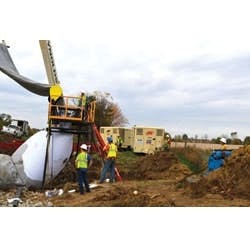Cured-in-Place Pipe Installed Under Indiana Interstate
Layne Inliner renewed approximately 1,340 ft of 48-in. to 96-in. corrugated metal storm culvert pipe using Inliner Technologies’ method of cured-in-place pipe (CIPP).
The project was subcontracted to Layne Inliner by Indiana Reline, prime contractor to the Indiana Department of Transportation, to renew deteriorating segments of storm sewer pipe along Interstate 70 reaching from the Illinois border to Indianapolis.
Using the air inversion and steam cure process, the 96-in segment—possibly the largest steam cure to date in the U.S.—presented the most significant challenges. Typically, CIPP in diameters over 72 in. are wet out via a process called “over-the-hole,” where the resin is injected into the tube onsite as it is being installed. Due to the interstate traffic and lack of easements along the highway, the larger operational footprint associated with an over-the-hole installation was not feasible, so Layne improvised.
“The combination of the large diameter liner, hot temperatures and busy interstate meant this had to be a carefully planned and orchestrated effort,” said Denise McClanahan, VP of Layne Inliner. “With daytime temperatures in the upper 90s, we modified our typical wet out and installation processes and timing to ensure the success of the install. The flexible nature of CIPP allows us to take challenging situations and tailor the CIPP to accommodate them.”
Because the liner was too large for a refrigerated truck, Layne constructed a custom-built trailer to transport the liner. The liner was trucked two hours from Orleans, Ind., to the jobsite near Indianapolis, where it was installed before sunrise.
Karl Bates, chief estimator and division manager for Indiana Reline, explained that interstate projects, by nature, all carry their own degree of complexity. “In addition to the CIPP we subcontract, we do a lot of sliplining, grouting and most recently, Centripipe projects for [Indiana Department of Transportation], and they are all unique,” Bates said. “Some don’t have frontage road access, [or] there are farms alongside the interstate with fencing, and each segment seems to have a different slope to accommodate. Safety is always an issue we need to address when dealing with four lanes of traffic.”
The flexible nature of CIPP—such as the Inliner product installed by Layne—continues to make it a preferred solution for roadway culvert rehabilitation.
Download: Here
